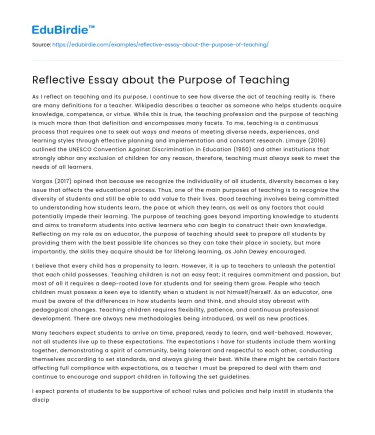As I reflect on teaching and its purpose, I continue to see how diverse the act of teaching really is. There are many definitions for a teacher. Wikipedia describes a teacher as someone who helps students acquire knowledge, competence, or virtue. While this is true, the teaching profession and the purpose of teaching is much more than that definition and encompasses many facets. To me, teaching is a continuous process that requires one to seek out ways and means of meeting diverse needs, experiences, and learning styles through effective planning and implementation and constant research. Limaye (2016) outlined the UNESCO Convention Against Discrimination in Education (1960) and other institutions that strongly abhor any exclusion of children for any reason, therefore, teaching must always seek to meet the needs of all learners.
Vargas (2017) opined that because we recognize the individuality of all students, diversity becomes a key issue that affects the educational process. Thus, one of the main purposes of teaching is to recognize the diversity of students and still be able to add value to their lives. Good teaching involves being committed to understanding how students learn, the pace at which they learn, as well as any factors that could potentially impede their learning. The purpose of teaching goes beyond imparting knowledge to students and aims to transform students into active learners who can begin to construct their own knowledge. Reflecting on my role as an educator, the purpose of teaching should seek to prepare all students by providing them with the best possible life chances so they can take their place in society, but more importantly, the skills they acquire should be for lifelong learning, as John Dewey encouraged.
Save your time!
We can take care of your essay
- Proper editing and formatting
- Free revision, title page, and bibliography
- Flexible prices and money-back guarantee
I believe that every child has a propensity to learn. However, it is up to teachers to unleash the potential that each child possesses. Teaching children is not an easy feat; it requires commitment and passion, but most of all it requires a deep-rooted love for students and for seeing them grow. People who teach children must possess a keen eye to identify when a student is not himself/herself. As an educator, one must be aware of the differences in how students learn and think, and should stay abreast with pedagogical changes. Teaching children requires flexibility, patience, and continuous professional development. There are always new methodologies being introduced, as well as new practices.
Many teachers expect students to arrive on time, prepared, ready to learn, and well-behaved. However, not all students live up to these expectations. The expectations I have for students include them working together, demonstrating a spirit of community, being tolerant and respectful to each other, conducting themselves according to set standards, and always giving their best. While there might be certain factors affecting full compliance with expectations, as a teacher I must be prepared to deal with them and continue to encourage and support children in following the set guidelines.
I expect parents of students to be supportive of school rules and policies and help instill in students the discipline needed to succeed. Parents must be willing to work with teachers and provide resources to students so they have the best chance for success. I expect parents to speak respectfully about school and staff at home so that students can model appropriate behavior and attitude towards staff as well. Their basic role is to do all they can to ensure their children maximize their full potential.
Every child can achieve, regardless of needs, learning styles, or interests. Giving the right support and utilizing the best and most appropriate strategies for individual needs is integral in facilitating students’ success, and this is what the true purpose of teaching is all about. Some students require more time, effort, patience, and planning, but with these in place, success is usually achieved. I conclude my reflection with words taken from a policy document of Hoyle Court Primary School (2021): “Every child is a learner and can achieve”.






 Stuck on your essay?
Stuck on your essay?

